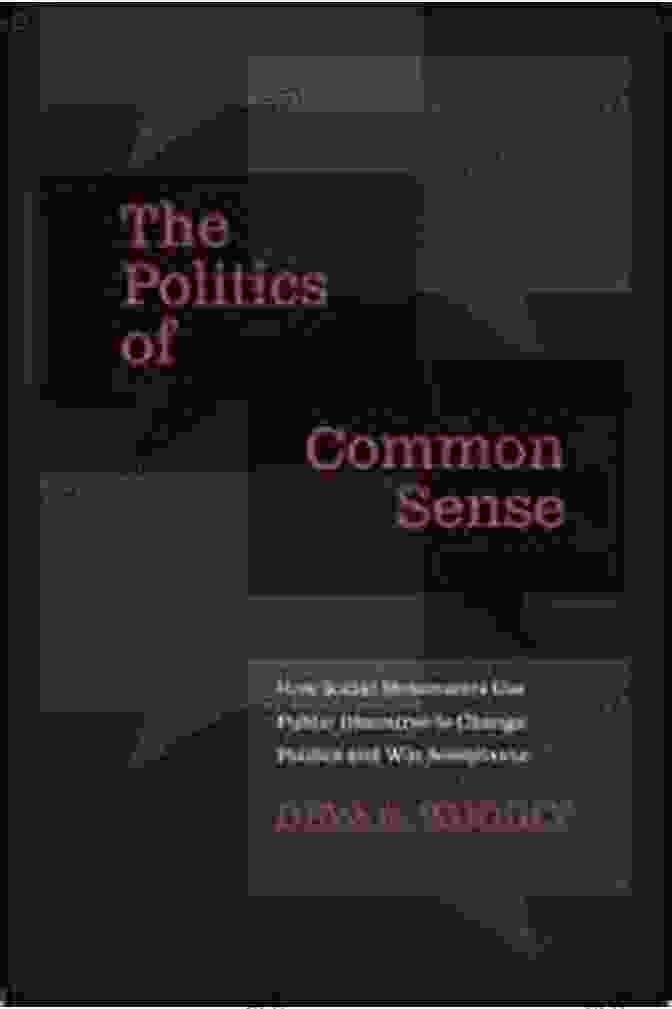The Politics of Common Sense

4 out of 5
| Language | : | English |
| File size | : | 5342 KB |
| Print length | : | 212 pages |
| Screen Reader | : | Supported |
The Politics of Common Sense is a book by Michael Sandel, a professor of government at Harvard University. The book is a critique of the current state of American politics, which Sandel argues has become increasingly polarized and ideological.
Sandel argues that this polarization has led to a decline in civility and a loss of common ground among Americans. He says that we have become so divided by our political beliefs that we are no longer able to have productive conversations with people who disagree with us.
Sandel argues that the solution to this polarization is to return to a more common-sense approach to politics. He says that we need to stop thinking in terms of left and right and start thinking about what is best for the country as a whole.
The Politics of Common Sense is a timely and important book. It offers a clear and concise analysis of the current state of American politics and provides a roadmap for how we can move forward.
Table of Contents
- The Problem with Polarization
- The Rise of Ideological Extremism
- The Decline of Civil Discourse
- The Loss of Common Ground
- A Return to Common Sense
The Problem with Polarization
Polarization is a state of extreme division in which people hold opposing views and are unable to find common ground. In the United States, political polarization has been on the rise for decades. This is due in part to the increasing influence of social media, which has created echo chambers where people are only exposed to information that confirms their existing beliefs.
Polarization has had a number of negative consequences for American politics. It has made it more difficult for politicians to compromise and find common ground, and has led to a decline in civility and public discourse.
The Rise of Ideological Extremism
One of the most worrying trends in American politics is the rise of ideological extremism. This is the tendency for people to hold extreme views on political issues, and to reject any compromise or moderation.
Ideological extremism is often driven by fear and anger. People who feel threatened by social or economic change may be more likely to adopt extreme views as a way of protecting themselves.
The rise of ideological extremism has made it more difficult to have productive conversations about political issues. People who hold extreme views are often unwilling to listen to opposing viewpoints, and may even resort to violence or intimidation to silence their opponents.
The Decline of Civil Discourse
Civil discourse is the ability to have respectful and productive conversations about political issues, even with people who disagree with us. In the United States, civil discourse has been on the decline for decades.
There are a number of factors that have contributed to the decline of civil discourse. One factor is the rise of social media, which has made it easier for people to spread misinformation and attack their opponents.
Another factor is the increasing polarization of American politics. As people have become more divided by their political beliefs, it has become more difficult for them to have respectful conversations with people who disagree with them.
The decline of civil discourse has had a number of negative consequences for American politics. It has made it more difficult for politicians to compromise and find common ground, and has led to a loss of public trust in government.
The Loss of Common Ground
Common ground is the shared values and beliefs that unite people. In the United States, there has been a loss of common ground in recent years. This is due in part to the increasing diversity of the American population, as well as the rise of ideological extremism.
The loss of common ground has made it more difficult for Americans to come together and solve our problems. We are more likely to see each other as enemies than as fellow citizens, and we are less likely to be willing to compromise or cooperate.
A Return to Common Sense
The solution to the problems facing American politics is to return to a more common-sense approach. We need to stop thinking in terms of left and right and start thinking about what is best for the country as a whole.
We need to be more willing to listen to opposing viewpoints, and to compromise and find common ground. We need to be more respectful and civil in our political discourse, and we need to focus on the things that unite us rather than the things that divide us.
A return to common sense will not be easy, but it is essential for the future of American democracy.
The Politics of Common Sense is a timely and important book. It offers a clear and concise analysis of the current state of American politics and provides a roadmap for how we can move forward.
Sandel argues that we need to return to a more common-sense approach to politics. He says that we need to stop thinking in terms of left and right and start thinking about what is best for the country as a whole.
Sandel's book is a must-read for anyone interested in understanding the current state of American politics. It is a thoughtful and provocative work that offers a clear and concise path forward.

4 out of 5
| Language | : | English |
| File size | : | 5342 KB |
| Print length | : | 212 pages |
| Screen Reader | : | Supported |
Do you want to contribute by writing guest posts on this blog?
Please contact us and send us a resume of previous articles that you have written.
 Book
Book Novel
Novel Page
Page Chapter
Chapter Text
Text Story
Story Genre
Genre Reader
Reader Library
Library Paperback
Paperback E-book
E-book Magazine
Magazine Newspaper
Newspaper Paragraph
Paragraph Sentence
Sentence Bookmark
Bookmark Shelf
Shelf Glossary
Glossary Bibliography
Bibliography Foreword
Foreword Preface
Preface Synopsis
Synopsis Annotation
Annotation Footnote
Footnote Manuscript
Manuscript Scroll
Scroll Codex
Codex Tome
Tome Bestseller
Bestseller Classics
Classics Library card
Library card Narrative
Narrative Biography
Biography Autobiography
Autobiography Memoir
Memoir Reference
Reference Encyclopedia
Encyclopedia Torkel Brekke
Torkel Brekke Meg Hayertz
Meg Hayertz Mary Hosmar
Mary Hosmar Matthew Henry
Matthew Henry Maxim Sokolenko
Maxim Sokolenko Srikanth Kondapalli
Srikanth Kondapalli Paul Slovic
Paul Slovic Mark Will Weber
Mark Will Weber Marina Duskovic
Marina Duskovic Matt Piccaver
Matt Piccaver Maria Wiesner
Maria Wiesner Marcel Dzama
Marcel Dzama Mark Belletini
Mark Belletini Stephen Bullivant
Stephen Bullivant Matan Hakimi
Matan Hakimi Mario Escobar
Mario Escobar Sunil Pathak
Sunil Pathak Reginald Laubin
Reginald Laubin Mark Wegman
Mark Wegman Mariette Nowak
Mariette Nowak
Light bulbAdvertise smarter! Our strategic ad space ensures maximum exposure. Reserve your spot today!

 Arthur C. ClarkeConfronting a Shadow: Facing The Church Complicity In Sexual Abuse And...
Arthur C. ClarkeConfronting a Shadow: Facing The Church Complicity In Sexual Abuse And... Floyd RichardsonFollow ·7k
Floyd RichardsonFollow ·7k Sammy PowellFollow ·18k
Sammy PowellFollow ·18k Mark TwainFollow ·7.7k
Mark TwainFollow ·7.7k Gordon CoxFollow ·7.6k
Gordon CoxFollow ·7.6k Marcus BellFollow ·13.9k
Marcus BellFollow ·13.9k Bob CooperFollow ·10.7k
Bob CooperFollow ·10.7k Jayson PowellFollow ·10.5k
Jayson PowellFollow ·10.5k Oscar WildeFollow ·4.7k
Oscar WildeFollow ·4.7k

 Ralph Ellison
Ralph EllisonIntelligent Video Surveillance Systems: The Ultimate...
In a world...

 Jeffrey Cox
Jeffrey CoxThe Origins of the Modern World: A Journey to the Roots...
Embark on an Extraordinary...

 Paulo Coelho
Paulo CoelhoUnlock the Power of Integrated Medical Imaging with...
In the rapidly evolving...

 Charles Reed
Charles ReedThe Christ of the Covenants: Unlocking the Mystery of...
Embark on a Profound...

 Elton Hayes
Elton HayesComputational Hydraulics: A Comprehensive Guide for...
In the realm of fluid dynamics,...
4 out of 5
| Language | : | English |
| File size | : | 5342 KB |
| Print length | : | 212 pages |
| Screen Reader | : | Supported |












